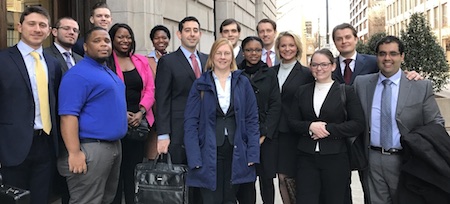Emory lawyers win religious freedom appeals court ruling
By Patti Ghezzi | Emory Law | Feb 20, 2017 9:02:00 AM

Headed to court:
Students join Mark Goldfeder and Sarah Shalf at the U. S. Court of Appeals for the 11th Circuit
The United States Court of Appeals for the 11th Circuit has ruled in favor of the plaintiff in Lester J. Smith v. Brian Owens, Commissioner, Georgia Department of Corrections, a case argued by Mark Goldfeder, senior lecturer and director of the Center for the Study of Law and Religion’s Restoring Religious Freedom Project.
The case involves a Muslim inmate who wishes to grow an untrimmed beard. Holt v. Hobbs, the 2015 U.S. Supreme Court Ruling that held that an Arkansas prison policy preventing a Muslim prisoner from growing a half-inch beard in accordance with his religious beliefs violated the Religious Land Use and Institutionalized Persons Act (RLUIPA), did not issue until the district court had granted summary judgment for the Georgia Department of Corrections, which has no religious exemption from its shaving policy, only a medical exemption.
On appeal, the court unanimously vacated the district court’s decision and remanded to the district court for further consideration in light of the more particularized inquiry that RLUIPA requires.
Goldfeder and Sarah Shalf, Professor of Practice, were appointed by Judge Frank Hull to represent Smith. Several students worked on briefs with Goldfeder and Shalf. The students helped Goldfeder prepare for the argument, and several local practitioners and Emory Law professors helped them moot it.
The case was complex, as while on appeal and after Holt was issued, the Department of Corrections altered its policy to allow everyone to have a half-inch beard, and then argued that Smith’s case was moot because at one point he had proposed a quarter-inch beard as an alternative he would find acceptable.
Goldfeder and Shalf contended that Smith had always wanted an untrimmed beard, that he had merely proposed a less restrictive alternative for the prison to consider, and that under RLUIPA he was entitled to a context-specific determination as to whether the government has a compelling interest in requiring him to cut his beard, and no less restrictive alternative. The Department of Corrections conceded that after Holt this was clearly required under RLUIPA, and that such an analysis had not been performed by the district court level.
The case now returns to the district court.
The Restoring Religious Freedom Project, funded by an anonymous grant, is a four-year educational initiative for law students and legal professionals who need training to work in religious freedom; professionals who encounter difficult religious freedom questions in their daily lives and workplaces; and citizens who want to learn more about religious freedom and its protections.

